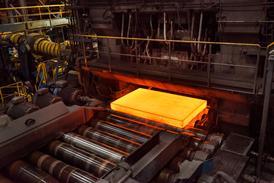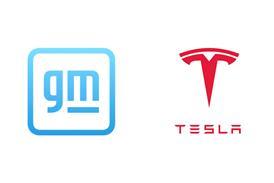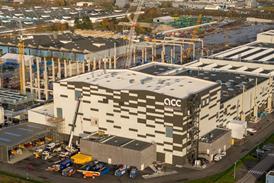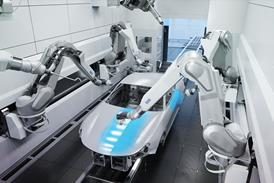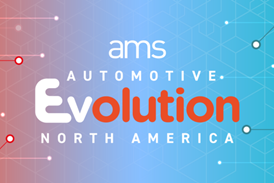
With customers demanding just-in-time delivery, transmission specialist Koki depends on reliability and uptime from its fleet of 60 robots
 The German company Koki, founded in 2003, makes precision gear shifters and boxes for some of the world’s leading automakers. The firm has a strong commitment to continuous improvement and innovation, as well as lean production. As part of this commitment, the company challenged ABB to find new ways of improving robot availability and productivity. It decided on the production site of Glauchau, Germany, which had experienced issues in the past.
The German company Koki, founded in 2003, makes precision gear shifters and boxes for some of the world’s leading automakers. The firm has a strong commitment to continuous improvement and innovation, as well as lean production. As part of this commitment, the company challenged ABB to find new ways of improving robot availability and productivity. It decided on the production site of Glauchau, Germany, which had experienced issues in the past.
ABB was already supporting Koki with service for its welding robots, which included annual maintenance as well as rapid response time for on-site issues. ABB proposed connecting one of Koki’s welding robots in Glauchau to ABB’s Condition Monitoring and Diagnostics, part of ABB Ability Connected Services.
ABB began connecting its robots to advanced services in 2007, and today over 6,700 ABB robots are linked to the ABB Ability Connected Services platform, at more than 750 customer sites, in 40 countries, with more than 40,000 robots delivered with embedded connectivity. Every new ABB robot can be connected to the Internet of Things to unlock leading digital technologies for greater performance and reliability.
Around the clockCondition Monitoring and Diagnostics is a secure service that monitors the condition of robots around the clock and alerts users to situations which could lead to unplanned downtime. It can send alarms by email or SMS in case of critical issues, or provide actionable data to operators through an intuitive web-based application. This data can also be used to better prepare service experts for more efficient on-site visits, for example, giving them a snapshot of the system at the point of the failure.
During the course of the year, ABB’s Condition Monitoring and Diagnostics detected conditions which could have caused the robot to shut down but the system was able to proactively alert Koki. The issue could be addressed before a greater problem occurred. For many manufacturers, the cost of downtime has dramatically increased during the past several years. Experts estimate that costs can reach more than $1 million an hour should an unplanned stoppage at a large automotive factory arise.

Avoiding lost timeGiven the just-in-time delivery expected by many of Koki’s customers, a welding robot failure can have severe consequences to its commitments. In the past Koki often had to convert another cell with the same robot model to duplicate the lost production, a time intensive process with risks.
Based on this positive experience, Koki has connected each of its 60 robots to ABB Ability Connected Services. Koki’s entire manufacturing process benefits from the new options that are available through the networked ecosystem.
Via ABB Ability Connected Services and the data derived from it, ABB can carry out condition-based maintenance and inspection more effectively. Ad hoc repair tasks can also be planned quickly and precisely together with Koki using live data. This allows activities to be prioritised, supporting the efficiency and smooth running of the most important customer processes.
The connected robots can also provide intelligence to benchmark the performance of their entire fleet and identify and correct underperforming robots.
Sven Sparmann is the site manager for maintenance and repair at Koki based in Niederwürschnitz, Germany. He explains that during audits, automotive manufacturers ask how Koki can guarantee the safety of the systems: “Robot maintenance, monitoring, service and support all play an important and decisive role here. The approach is very practical, and we are informed in advance. Error detection allows us to carry out adjustments when production has stopped, without interrupting the production process.”
“We’ll be linking all new robots – both at our domestic and international sites – to ABB Ability Connected Services, that’s quite clear,” Sparmann concludes.
Get connected
‘Service’ today no longer means ‘fixing what is broken.’ ABB Ability Connected Services use actionable intelligence from your robots and advanced analytics to improve uptime and performance while lowering total lifetime costs. These powerful benefits are at your fingertips 24/7 through MyRobot, ABB’s intuitive web-based dashboard. ABB began connecting its robots to advanced services in 2007, and today over 7,000 ABB robots are connected to the ABB Ability Connected Services platform, at more than 750 customer sites, in 40 countries, with more than 40,000 robots delivered with embedded connectivity.
 More than 7,000 robots at customer sites in 40 countries are networked into ABB's Ability Connected Services platform
More than 7,000 robots at customer sites in 40 countries are networked into ABB's Ability Connected Services platformEvery ABB robot can be connected to the Internet of Things to unlock leading digital technologies for greater performance and reliability. ABB Ability Connected Services can prevent up to 25% of incidents and speed issue resolution and response times by up to 60%. The suit consists of the five services Condition Monitoring & Diagnostics, Backup Management, Remote Access, Fleet Assessment, and Asset Optimisation.
The user interface MyRobot unlocks access to ABB Ability Connected Services. It provides actionable intelligence which helps to identify non performing systems and immediate notification in case of indication. Condition Monitoring & Diagnostics is a secure 24/7 service, ensuring faster reaction time proactive support, higher efficiency, and optimised ABB technical support.
It helps robot systems running at optimal performance. Backup Management provides automatic or manual backups for a robot system, remotely from the cloud, or from any server. Remote Access provides remote and secure access to robot controllers and connected robot equipment, on customer request. Fleet Assessment lets users compare a robot with ABB’s entire fleet of connected robots to better prioritise their service needs. Asset Optimisation provides deep analysis to identify robots, components and software that are not running optimally. Reports then provide proactive recommendations for optimised performance and uptime.





